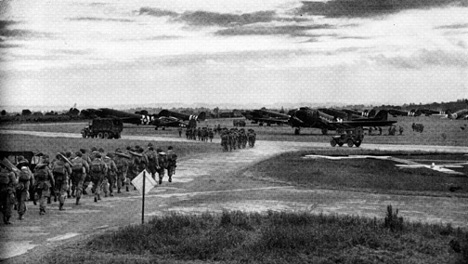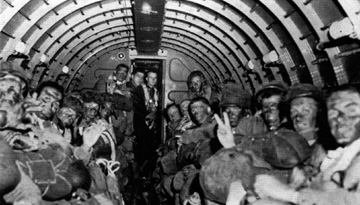|
in honor of Maj. Norman K. Arvidson
Chapter 4 My war diary for D-Day, 1944 is recorded below. It records events that took Charles W. Lusher
I was visiting the 88th crews in their enclosure area when news of the big event came. Major Gates, the C.O., came by and shook the hand of each man that was to fly and told them to get ready. Within five minutes they were out the door and heading toward the planes. My heart went with them for I knew the heart of each man and the confusion of courage and fears that had accumulated since we first landed in England. I spoke to them singly and in groups. There weren’t many words, just a clasp of hands and a deep look into each other’s eyes. I could only promise to pray. The 89th Squadron was only a few yards away, but the pilots were already gone by the time I reached their area. Most of the crews were still about the barracks so I had a word with them. I found the men of the 90th Squadron still putting on their impregnated clothing and making final preparations. I shook every man’s hand as they left their “Concentration camp” and felt the extra grip that gave me a better undrstanding of my men than I had before. Capt. Pawloski, the C.O., gave me a jeep lift to the line for most everyone was there by now. He tried to sing “My Wild Irish Rose” but soon apologized saying “It isn’t good, but it is loud.”
Photo ctsy “Life’s Picture History of World War II” I had not yet spoken to the crews of the 87th Squadron so I set out for their area. Paratroopers were about each plane inspecting their chutes or resting on the ground because of their heavy equipment. One said, “Chaplain, here is the latest version of an army mule.” A few paratroopers were veterans of the earlier Mediterranean battles, but most of these men had never before made a combat jump. Here they were now with faces painted with chocolate, helmets camouflaged, and a mountain of equipment. Here they stood ready to do the things for which they had trained for months. Most of these boys had never killed a man and I shudered to think of the thoughts that must be in their minds. Frankly, I didn’t know what to say for my gospel is of Jesus, Prince of Peace. I wondered what I could do here, and still wonder, but I kept on. Most of the fellows were resting under the wings of the planes, smoking a cigarette, and trying to be as comfortable as possible.
Photo ctsy “Life’s Picture History of World War II” To them I said, “I can’t run your ship, but I will pray.” Their response was an emotional, “Thanks , chaplain,” or “Thanks for coming.” On my war around, I met our invasion commander, General “Ike” Eisenhower, who was also mixing with the men. The lasts of the planes were warming up their engines as I finished my rounds. It was 12:10 P.M. when Lt. Col. Donalson and Lt. Col Daniels pulled the lead ship out of the parking area. Soon they would be pushing the jump button on their plane named “That’s All, Brother” and the invasion of Europe would be on. In that ship was Chaplain Hall and the leaders of the 101st. Lt. Col Daniels had his little Scottie dog sitting on a flack suit beside him. After the lead ship came the others and soon all were in take-off position. When the last ship was airborne, I knelt there on the runway asking God for their safety. Sgt. Long, Col. Daniel’s driver, waited for me and drove me back to the chapel where a number of us had decided to meet for prayer. Before going into the chapel door, I stood watching the mass of red and green lights form in perfect formation and then head toward the sousthwest for the 53rd Wing rendezvous point. When the lights had faded into the distance, we went into the chapel together. We prayed for God’s help and protection for the men in those 81 planes and also for millions of men in air, land, and sea combat units that were at the crisis of life in this very hour. We prayed for our enemies, too, and asked that God might cause wars to cease unto the ends of the earth. Oh, that mercy and forgiveness might be granted unto ALL his children. End of Page 1, Chapter 4 — Go to Page 2
Cover — Introduction — Table of Contents Chapter — 01 — 02 — 03 — 04 — 05 — 06 — 07 — 08 — 09 — 10 Or Go To Or |

